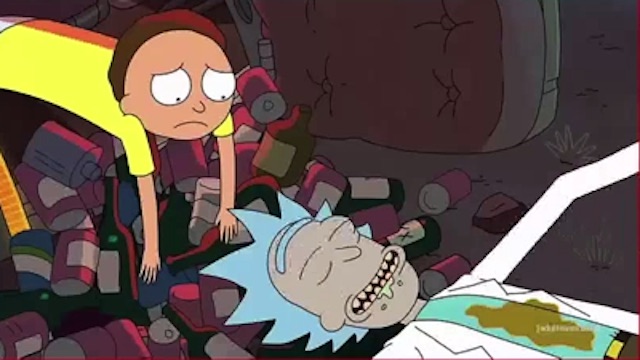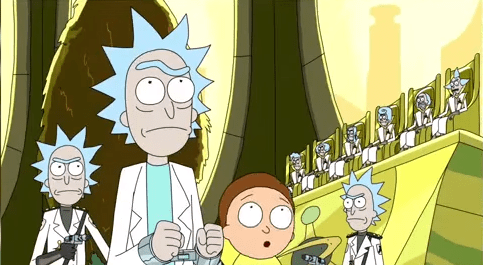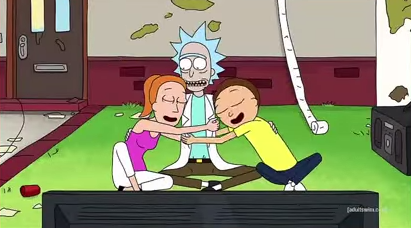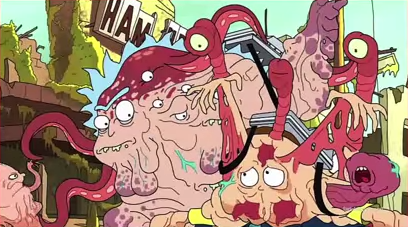Endearing Awful People: Or, How I Accidentally Fell in Love with Rick and Morty

Comedic sociopathy—the effect produced when a show’s prioritization of jokes over relationships ends up giving off the feeling that no one involved has the capacity to feel for other human beings—is generally the furthest thing from my cup of tea. While shedding emotion for punchlines can work beautifully in short standalone works (one need look no further than classic Looney Tunes shorts to prove that), it tends to clash badly with anything requiring continuity.
You’ll find this as one of the foremost reasons people give for checking out on Family Guy and later seasons of The Simpsons, for example. And yet it’s far more rarely an accusation laid against British comedy, whose most famous works (Black Adder, Fawlty Towers, Father Ted, the Monty Python canon to an extent) pretty much run on flippant cruelty. The crucial difference is the format: the latter shows tend very much toward absurdity, asking nothing of the audience but to point and laugh at the hypocritical jackassery before them; while American comedy born from that sitcom mold finds itself married to the emotional resolution, often building the shape of what should be an emotional dynamic only to discard it when inconvenient. The disconnect between familiar beats relying on the audience’s emotions and the cruelty required to sell the jokes (comedy, after all, is pretty much always seeded in some kind of pain) becomes jarring over time, and has a way of breeding resentment in the audience. At the very least, yours truly has little use for them.
All of which is an extremely long-winded way of saying that Rick and Morty is, eight times in ten, a black-hearted grotesquery with more interest in its odd, world-hopping scenarios than building any kind of warm and fuzzy feelings. And after 11 episodes, I am more invested in its world and characters than any adult comedy of the last few years. In fact, it might be Adult Swim’s best program since the indomitable Venture Bros.
Originally stemming from an extremely explicit parody of Back to the Future about “Doc and Mharti” (which I’m not going to link here but is pretty easily searchable on YouTube for the morbidly curious), the show was eventually brought to AS by Justin Roiland (creator of said parody and voice of both titular characters as well as Adventure Time’s Lemongrab) and Dan Harmon (yes, the Community guy). Its first season ran from December 2013 to April 2014, with a second season due on July 26th.
The plot goes like this: mad scientist Rick Sanchez is constantly snatching his grandson Morty out of his day-to-day life to play assistant on adventures that range from cross-galaxy and universe travel via Rick’s portal gun to an experimental amusement park built inside a homeless man. Rather than being enchanting and wondrous, each episode leaves Morty just a little more scarred—and the struggle of whether to refuse to accompany Rick at the risk of losing one of his only meaningful relationships is a strain on Morty for most of the season.
Does that sound fucked up? It is. That’s only the tip of the iceberg, by the way. Morty’s mother Beth lets Rick run rampant across the multiverse with her son because she’s desperate to keep her estranged father in her life after 20 years away, while her husband Jerry keeps quiet out of fear that she’ll leave him; and meanwhile, oldest daughter Summer lives with the suspicion that she’s the high school regret that got in the way of her parents’ lives. And all of that is a constant powder keg ready to explode into nastiness at any moment, usually set off by Rick offhandedly inventing a short term problem to his family’s demands and leaving them to see the consequences through.
So that leaves the question of what makes it special. The first answer is the show’s clever use of the multiverse concept, which it weaves through in an episodic fashion before pulling the strings of consequence together in a way that both rocks the audience (in that it was expected that each episode to an extent stood alone) while on a practical level simply following the line of events thusfar to their cumulative conclusion. It gives weight to the character’s actions, particularly Morty’s anxiety (which is by inference likewise cumulative and thus almost more distressing than comedic for all of Roiland’s histrionic vocals), and a source of grounding for even the more out-there adventures.
The second answer is the lynch pin holding the show together: character consistency. There is a fine but crucial line between a callous action coming from a character making a choice that makes sense within their worldview and previous actions, and a character making a choice because that’s what they need to do for the plot at hand to happen. And even in as small an episode count as it’s had to now, Rick and Morty has hit the former on the head every time. If Beth turns a blind eye to her son being put into life-threatening situations, it’s down to her belief that his endangerment is better than being trapped in an unfulfilling normal life. If Rick acts like a borderline sociopath, it makes sense from the implication that the horrors the audience and Morty have been seeing are an infinitesimal fraction of what Rick’s grown desensitized to over the years.
Every major beat comes from a character place, and while the results aren’t always heartwarming (more often than not, with Rick at the helm, they traipse merrily into the downright disturbing) they at least manage to feel honest. By the same token, the moments when the script goes in for a brief respite of bonding feel like oases in the desert, thoroughly earned and almost more like a breakthrough than a bone thrown by the writers to keep the audience placated. They’re frequently selfish characters making terrible decisions, but they always manage to feel within the range of believability as people. And what can I say? Maybe it’s the Lupin III fan in me, but I’m a real sucker for a bunch of jerks circling together to protect each other when the chips are down.
The fact that Harmon and Roiland have achieved all this in a single season (knowing that first seasons are always rough in hindsight) has left me more than a bit starry-eyed as to the show’s potential future—including the introduction of some major mythology and a glaring dangling plot thread in the second-to-last that could well feed the show through another few seasons at least. And the already well-executed character moments have barely dipped a toe into the cast’s potential (after Harmon’s interview with Hitfix, I’m especially eager to see Beth explored in further detail). The way the release has been drip fed it seems like it could be a long wait (there’s more than one reason I compared it to Venture Bros), but I’m more than happy to camp out on that doorstep.
Because let’s face it, they had me at “Cronenberg Morty.”
You can watch all the episodes if you have Hulu Plus, and it’s also pretty reliably available on YouTube. (As a last heads up, the show does contain sexual assault. And while it does, by my estimation, pass the very minimal bar of not trivializing the trauma for the characters involved—with any comedy coming from a place of “laugh to fill the silence with something besides horrified screams”—it’s still something I firmly believe a viewer should know before walking into a comedy series).
Want to share this on Tumblr? There’s a post for that!
Vrai is a queer author and pop culture blogger; there is a hole in their physical media collection yearning for a Blu-Ray release of this series. You can read more essays and find out about their fiction at Fashionable Tinfoil Accessories, support their work via Patreon or PayPal, or remind them of the existence of Tweets.
—Please make note of The Mary Sue’s general comment policy.—
Do you follow The Mary Sue on Twitter, Facebook, Tumblr, Pinterest, & Google +?
Have a tip we should know? tips@themarysue.com


